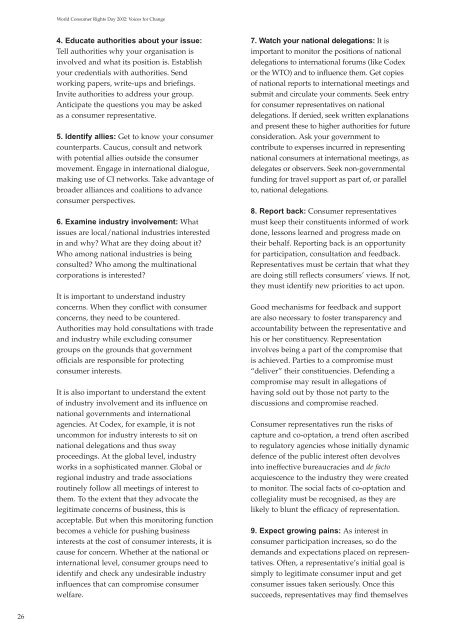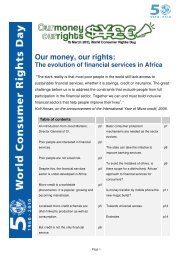Voices for Change: the Consumer Right to Representation
Voices for Change: the Consumer Right to Representation
Voices for Change: the Consumer Right to Representation
You also want an ePaper? Increase the reach of your titles
YUMPU automatically turns print PDFs into web optimized ePapers that Google loves.
26<br />
World <strong>Consumer</strong> <strong>Right</strong>s Day 2002: <strong>Voices</strong> <strong>for</strong> <strong>Change</strong><br />
4. Educate authorities about your issue:<br />
Tell authorities why your organisation is<br />
involved and what its position is. Establish<br />
your credentials with authorities. Send<br />
working papers, write-ups and briefings.<br />
Invite authorities <strong>to</strong> address your group.<br />
Anticipate <strong>the</strong> questions you may be asked<br />
as a consumer representative.<br />
5. Identify allies: Get <strong>to</strong> know your consumer<br />
counterparts. Caucus, consult and network<br />
with potential allies outside <strong>the</strong> consumer<br />
movement. Engage in international dialogue,<br />
making use of CI networks. Take advantage of<br />
broader alliances and coalitions <strong>to</strong> advance<br />
consumer perspectives.<br />
6. Examine industry involvement: What<br />
issues are local/national industries interested<br />
in and why? What are <strong>the</strong>y doing about it?<br />
Who among national industries is being<br />
consulted? Who among <strong>the</strong> multinational<br />
corporations is interested?<br />
It is important <strong>to</strong> understand industry<br />
concerns. When <strong>the</strong>y conflict with consumer<br />
concerns, <strong>the</strong>y need <strong>to</strong> be countered.<br />
Authorities may hold consultations with trade<br />
and industry while excluding consumer<br />
groups on <strong>the</strong> grounds that government<br />
officials are responsible <strong>for</strong> protecting<br />
consumer interests.<br />
It is also important <strong>to</strong> understand <strong>the</strong> extent<br />
of industry involvement and its influence on<br />
national governments and international<br />
agencies. At Codex, <strong>for</strong> example, it is not<br />
uncommon <strong>for</strong> industry interests <strong>to</strong> sit on<br />
national delegations and thus sway<br />
proceedings. At <strong>the</strong> global level, industry<br />
works in a sophisticated manner. Global or<br />
regional industry and trade associations<br />
routinely follow all meetings of interest <strong>to</strong><br />
<strong>the</strong>m. To <strong>the</strong> extent that <strong>the</strong>y advocate <strong>the</strong><br />
legitimate concerns of business, this is<br />
acceptable. But when this moni<strong>to</strong>ring function<br />
becomes a vehicle <strong>for</strong> pushing business<br />
interests at <strong>the</strong> cost of consumer interests, it is<br />
cause <strong>for</strong> concern. Whe<strong>the</strong>r at <strong>the</strong> national or<br />
international level, consumer groups need <strong>to</strong><br />
identify and check any undesirable industry<br />
influences that can compromise consumer<br />
welfare.<br />
7. Watch your national delegations: It is<br />
important <strong>to</strong> moni<strong>to</strong>r <strong>the</strong> positions of national<br />
delegations <strong>to</strong> international <strong>for</strong>ums (like Codex<br />
or <strong>the</strong> WTO) and <strong>to</strong> influence <strong>the</strong>m. Get copies<br />
of national reports <strong>to</strong> international meetings and<br />
submit and circulate your comments. Seek entry<br />
<strong>for</strong> consumer representatives on national<br />
delegations. If denied, seek written explanations<br />
and present <strong>the</strong>se <strong>to</strong> higher authorities <strong>for</strong> future<br />
consideration. Ask your government <strong>to</strong><br />
contribute <strong>to</strong> expenses incurred in representing<br />
national consumers at international meetings, as<br />
delegates or observers. Seek non-governmental<br />
funding <strong>for</strong> travel support as part of, or parallel<br />
<strong>to</strong>, national delegations.<br />
8. Report back: <strong>Consumer</strong> representatives<br />
must keep <strong>the</strong>ir constituents in<strong>for</strong>med of work<br />
done, lessons learned and progress made on<br />
<strong>the</strong>ir behalf. Reporting back is an opportunity<br />
<strong>for</strong> participation, consultation and feedback.<br />
Representatives must be certain that what <strong>the</strong>y<br />
are doing still reflects consumers’ views. If not,<br />
<strong>the</strong>y must identify new priorities <strong>to</strong> act upon.<br />
Good mechanisms <strong>for</strong> feedback and support<br />
are also necessary <strong>to</strong> foster transparency and<br />
accountability between <strong>the</strong> representative and<br />
his or her constituency. <strong>Representation</strong><br />
involves being a part of <strong>the</strong> compromise that<br />
is achieved. Parties <strong>to</strong> a compromise must<br />
“deliver” <strong>the</strong>ir constituencies. Defending a<br />
compromise may result in allegations of<br />
having sold out by those not party <strong>to</strong> <strong>the</strong><br />
discussions and compromise reached.<br />
<strong>Consumer</strong> representatives run <strong>the</strong> risks of<br />
capture and co-optation, a trend often ascribed<br />
<strong>to</strong> regula<strong>to</strong>ry agencies whose initially dynamic<br />
defence of <strong>the</strong> public interest often devolves<br />
in<strong>to</strong> ineffective bureaucracies and de fac<strong>to</strong><br />
acquiescence <strong>to</strong> <strong>the</strong> industry <strong>the</strong>y were created<br />
<strong>to</strong> moni<strong>to</strong>r. The social facts of co-optation and<br />
collegiality must be recognised, as <strong>the</strong>y are<br />
likely <strong>to</strong> blunt <strong>the</strong> efficacy of representation.<br />
9. Expect growing pains: As interest in<br />
consumer participation increases, so do <strong>the</strong><br />
demands and expectations placed on representatives.<br />
Often, a representative’s initial goal is<br />
simply <strong>to</strong> legitimate consumer input and get<br />
consumer issues taken seriously. Once this<br />
succeeds, representatives may find <strong>the</strong>mselves






![pkef]Qmf eg]sf] s] xf] < - Consumers International](https://img.yumpu.com/6479658/1/184x260/pkefqmf-egsf-s-xf-consumers-international.jpg?quality=85)
